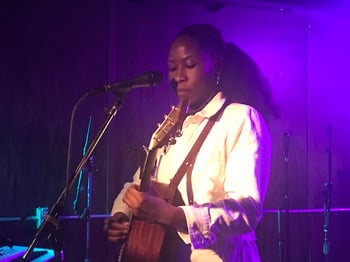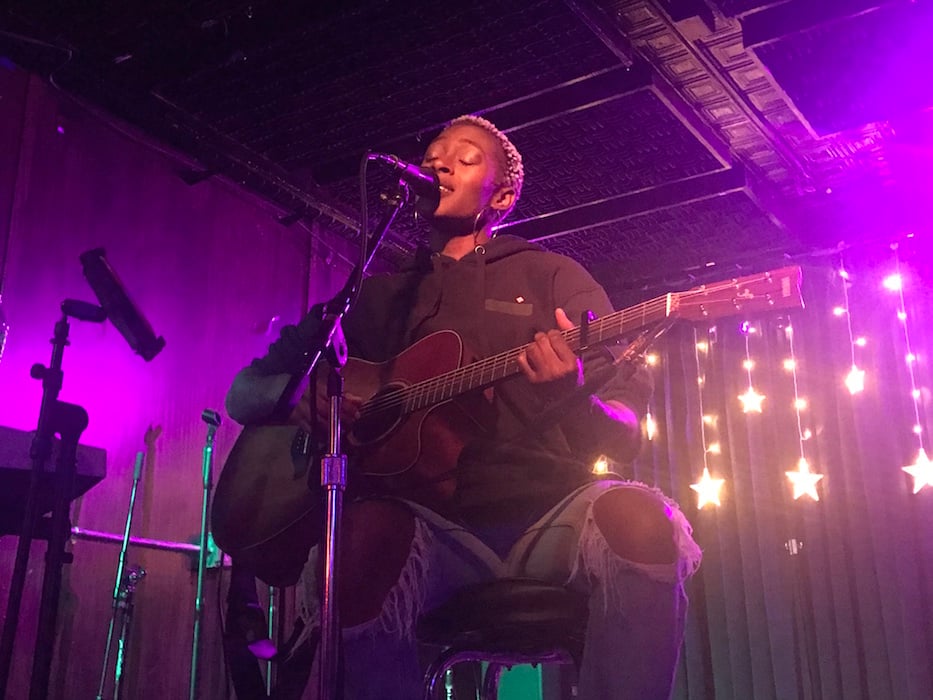Shanell Alyssa stood onstage, decked out in a striking white boiler suit. On her feet were color-blocked track sneakers. Her outfit—part utilitarian, part lighthearted—gestured toward her night’s mission: to use music as a tool to bring the audience together.
She began strumming bass notes. Then she used her voice: “I am more than what I see; I am who I’m meant to be.”
By the song’s bridge, the crowd had joined in, mixing their own voices with hers. As the crowd’s voices intermingled, the four walls of Cafe Nine became a space for collective expression and healing.

Wednesday night, the singer-songwriters Shanell Alyssa and Riki Stevens drew a medium-sized crowd to Cafe Nine. Both used time-tested techniques, including easy-to-remember lyrics, call and response, and keys in the audience’s vocal range, to spark audience participation.
Drawing a crowd together through music is a skill Shanell Alyssa has been cultivating for nearly her entire life, first as a musician in her local church and later as performer in Boston’s music scene. During her five-part “Reset” concert series in Boston, the musician created music-based programming to facilitate community dialogue on racism, poverty, and other social justice issues. She co-organized it while training to become a licensed clinical mental health counselor at Lesley University.
Across the bar, reunions of all kinds unfolded. Toward the back, five friends in their early twenties leaned in close to one another to speak over the sound of the music. Two thirty-somethings in leather biker jackets shared laughter over beers on tap. A couple at the bar sat side by side, talking between breaks in the performances. It almost felt like the venue had returned to the time before Covid-19.
Still, reminders of the virus were scattered throughout the venue. As people trickled in to reunite with friends already inside, the greeter Lorenzo checked for vaccination cards and Covid-19 test results. The windows along one side of the venue were cracked open to permit airflow. A few people sipped drinks before quickly pulling their masks back up to their faces.
Shanell Alyssa’s music acknowledged the emotional weight of the past two years—which have included the twin pandemics of Covid-19 and white supremacy, a surge in anti-Black violence, and growing climate catastrophe. Toward the middle of her set, the musician played her original song “Race to Dawn,” which she wrote, she told the audience, to process the unexpected loss she experienced after the death of four family members over a four-year period.

Riki Stevens. Al Larriva-Latt Photos.
“Sometimes when you go through hardship, you want that time to just hurry up and be over,” she counseled. “But we don’t really have control over how long it takes to get through something.”
With resonant bass notes setting the rhythm, she began plucking a lighter melody. Her lyrics equated the grieving process to that of waiting through the night for the sun to rise. At the song’s bridge came a key change, and with it, a sense of hope: “When I get through night; I’ll see joy in the morning light.”
As the musician sang, her steady presence radiated a warmth across the room. She reached out her left hand, fingers outstretched and palm opened, when particularly moved. The venue became a space where emotions were welcome.
As she opened, Stevens used similar techniques to stir the audience into participation, which most recently she’s been putting to work in her professional life by making music videos for children with developmental disabilities.
Seated in front of the mic in an oversized hoodie and form-fitting jeans, she fiddled with her capo onstage, searching for a congregational key so the audience could sing along with her. “I’m hoping that you’ll sing along with me—will you?” she asked.
A chorus of “yes,” cascaded through the audience.
With the ease of a seasoned performer, she taught the audience the lyrics to her song “It was Love.” Then she began to lead the audience along with her. In placid tones, she repeated the words “it was love.” True to her promise, the lyrics were easy to remember and meaningful, two metrics she told the audience she uses when writing sing-along songs.
The audience joined in unison and the room reverberated with a variety of pitches and tones. “It was love, it was love,” the audience repeated, “that carried me.”
Learn more about Cafe Nine at their website.